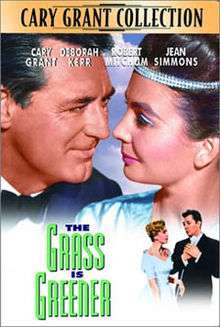The Grass Is Greener
The Grass Is Greener is a 1960 comedy film directed by Stanley Donen and starring Cary Grant, Deborah Kerr, Robert Mitchum, and Jean Simmons. The film was adapted by Hugh Williams and Margaret Vyner from the play of the same name which they had written and found success with in London's West End.
| The Grass Is Greener | |
|---|---|
 | |
| Directed by | Stanley Donen |
| Produced by | Stanley Donen James H. Ware Cary Grant |
| Written by | Hugh Williams Margaret Vyner |
| Starring | Cary Grant Deborah Kerr Robert Mitchum Jean Simmons |
| Music by | Noël Coward |
| Cinematography | Christopher Challis |
| Edited by | James Clark |
Production company | Grandon Productions Ltd |
| Distributed by | Rank Film Distributors Universal Pictures (US) |
Release date |
|
Running time | 104 minutes |
| Country | United Kingdom |
| Language | English |
| Box office | $6 million (US)[1] |
Plot
The Earl and Countess of Rhyall (Cary Grant and Deborah Kerr) are facing financial troubles and are therefore forced to permit guided tours of their stately home.
A suave, somewhat obnoxious American oil tycoon, Charles Delacro (Robert Mitchum), barges into the lady of the manor's private quarters, either deliberately or by mistake. He introduces himself, explaining the family name was originally "Delacroix" but his grandfather tired of Americans pronouncing the "X" in the name.
Delacro's attentions to the Countess turn her head. Rather than behave jealously, the Earl invites the American to come visit, taking their guest fishing as part of a bid to impress the importance of heritage on Delacro. Also visiting is an ex-girlfriend of Lord Rhyall's, the American heiress Hattie Durant (Jean Simmons).
A love triangle (or quadrangle) soon develops. Determined to remain civilized at all times, the Earl pretends not to know that his wife has begun having an affair with Delacro at his London hotel, or that her new mink coat is a gift from her lover.
He does suggest to Delacro, however, that he feels a compulsion to defend his wife's honor, and therefore challenges the American to a duel. They aim and fire once apiece inside the mansion, where the Earl is wounded in the arm while Delacro is unharmed. It is soon revealed that Sellers, the family butler who loaded the pistols, made sure both men were firing blanks while he, Sellers, an expert shot, wounded the Earl with a weapon of his own.
As much as she would like to, Hilary cannot bring herself to leave her loving husband for the new man in her life. Delacro drives off, taking Hattie with him.
Cast
- Cary Grant as Victor, Earl of Rhyall
- Deborah Kerr as Hilary, Countess of Rhyall
- Robert Mitchum as Charles Delacro
- Jean Simmons as Hattie Durant
- Moray Watson as Trevor Sellers, the Butler
Casting
Originally Cary Grant turned down the role of Victor. Afterwards the role was subsequently offered to his friend Rex Harrison and he accepted. However right before production began, Harrison's wife Kay Kendall fell gravely ill and he was forced to leave the production in order to tend to her. Grant, out of respect for cast and crew, and to keep the filming running according to schedule, decided then to finally take the part.
It was originally intended by director Stanley Donen that Cary Grant would play the part of Delacro, the American tourist, while Rex Harrison and Kay Kendall were respectively cast as "Victor Rhyall" and "Hattie". But Kendall died soon after completing an earlier Donen film, "Once More With Feeling", and Harrison dropped out of the film because of this. Cary Grant agreed to play Victor instead of Delacro, and both Rock Hudson and Charlton Heston were approached about playing the American character. Both refused, and Robert Mitchum was cast quite late in the proceedings, making no fuss at all about taking third-billing. Cary Grant often claimed this had "saved the film" and praised his performance highly.
Third of four movies that paired Deborah Kerr and Robert Mitchum. Cary Grant's third collaboration with Deborah Kerr. They had previously worked together on Dream Wife (1953) and An Affair to Remember (1957). Moray Watson was the only member of the original stage cast to be retained for the film version.
Set design
British interior decorator Felix Harbord served as the film's special consultant for settings. Osterley Park was used as the location for the stately home.
Reception
While the film was a moderate success at the United Kingdom box office, it was a box office bomb in the United States. Despite this, it was reviewed positively by critics and has since developed a following and has been a staple of American cable television.[2] At the time of its release, Jean Simmons's performance as a madcap heiress earned some praise and a Laurel Award nomination.
References
- "The Grass is Greener - Box Office Data". The Numbers. Retrieved 14 November 2011.
- "The Grass Is Greener (1960)". Rotten Tomatoes. Retrieved 7 May 2016.